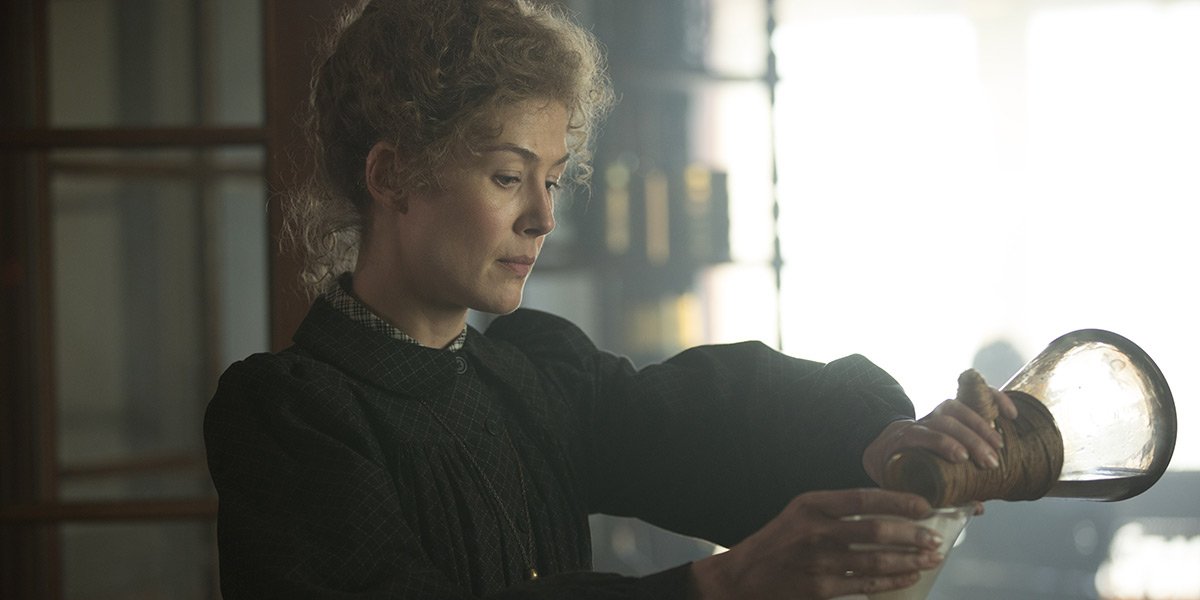
Film Review: Radioactive
Film Reviews
Radioactive
Director: Marjane Satrapi
StudioCanal and Working Title Films
Streaming on Amazon Prime: 07.24
I’ve been a film critic for more than 14 years now, and I’m a pretty staunch defender when it comes to attacks against my colleagues, such as the misconception that we love to hate everything—believe me, you don’t take this job unless you love movies.
But one line that I’ve grown increasingly tired of reading from others in my field regards biopics: namely, variations on the theme that it’s a shame to see a fascinating and innovative person be the subject of such a routine film. It’s a good line, and I’ll admit that it’s very true in some cases. Nevertheless, I feel that this fallback stance has become as stale as the movies it criticizes, and I have to place a serious portion of the blame for what went wrong with the chaotic new film Radioactive squarely on the shoulders of film critics.
The film documents the life and work of Marie Skłodowska-Curie (Rosamund Pike) during her early days as a struggling young scientist in a time when women simply did not do that sort of thing. When Marie meets Pierre Curie (Sam Riley), a standoffish relationship gives way to a research partnership and a marriage, and the two quite literally change the world by discovering polonium and radium. Throughout the film, scenes from Marie’s life are interwoven with those depicting the future impact of her discoveries, including brachytherapy, the atomic bombings of Hiroshima and Nagasaki, the Manhattan Project and the Chernobyl disaster.
Director Marjane Satrapi (Persepolis) has an undeniable talent and visual flair, but her desire to make a film that’s as visionary as Curie herself causes the movie to run wild. This includes stylistic choices that often play like that bastard offspring of Terrence Malick and Michael Bay, jumping from experimental symbolism—some of which made me laugh out loud—to over-the-top money shots and an overall level of subtlety and restraint that made me mutter “oh no, Joe Wright was involved in this somehow, wasn’t he?” Indeed, the director of Darkest Hour and Anna Karenina is credited as an executive producer.
The score is by brothers Evgueni and Sacha Galperine, and not by Daft Punk, though you will doubtless find yourself wondering when they are going to put Madame Curie on the game grid. The moments where the film jumps forward to portray the fallout of these experiments are an intriguing concept that becomes unbearably intrusive, and the extended sequence of a nuclear test in Nevada—complete with model town—only succeeds in making you think of Indiana Jones climbing into a refrigerator.
There is actually a lot to love about Radioactive, from the flawless lead performance by Pike to the exquisite cinematography by the great Anthony Dod Mantle, to the uneven but often memorable dialogue from screenwriter Jack Thorne (Harry Potter and the Cursed Child, The Eddy). But while it’s great to see a biopic that is smarter than Bohemian Rhapsody (let’s face it, Bumblebee was smarter than Bohemian Rhapsody), the director’s self-conscious efforts to reinvent the wheel undermine the storytelling at almost every turn. The film fairs best in the final section, and the interplay between Pike and Anya-Taylor Joy as Curie’s daughter Irène as the two work together to bring X-Ray machines and advanced medicine to frontline troops during World War I is really marvelous. I didn’t hate this film by any means, and, in fact, if Satrapi had been able to w, I could have really loved it.
Frustratingly, I still see critics who are blasting Radioactive for being too pedestrian, and I find that to be unfortunate because it’s a lazy dismissal that is every bit as problematic as the cookie-cutter approach to the genre. Satrapi has undeniably gone to great effort to create something unique here, and, at the very least, it deserves a unique appraisal by those who bear some responsibility for the pressures that lead to the ultimate failure of what should have been a very satisfying cinematic experience. –Patrick Gibbs
